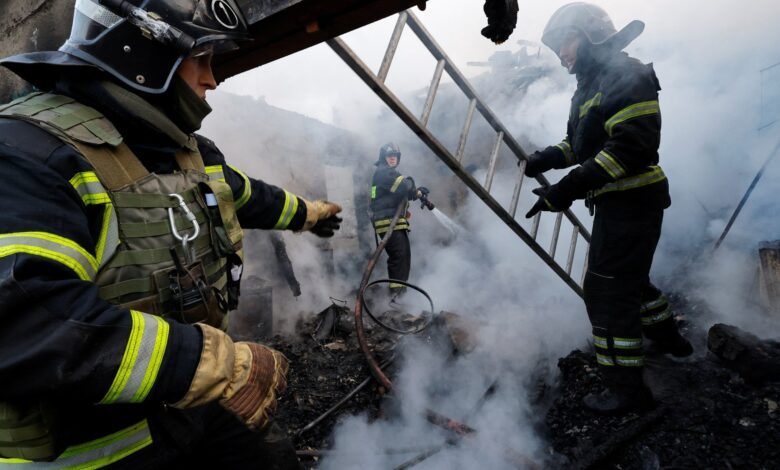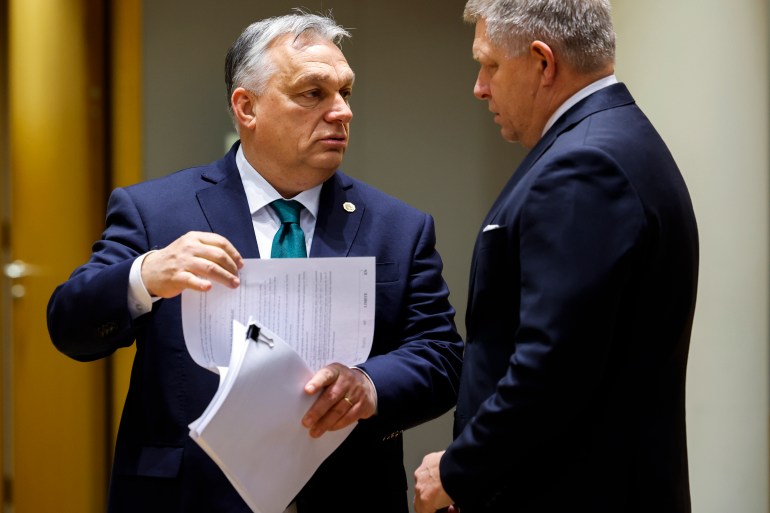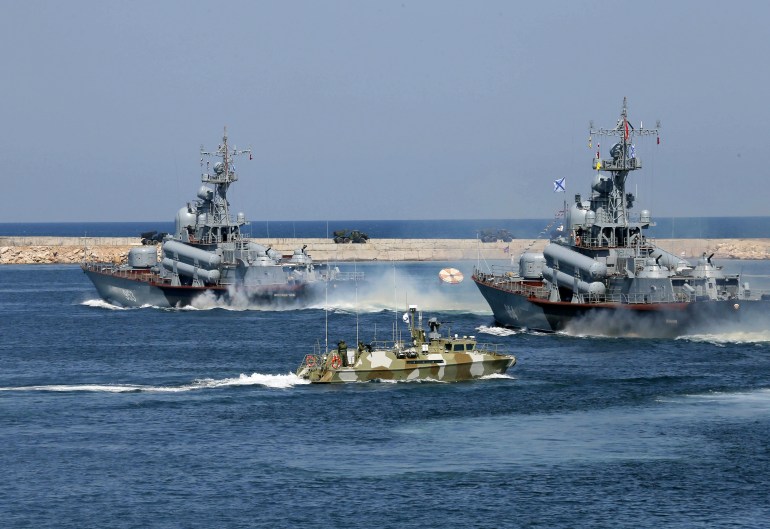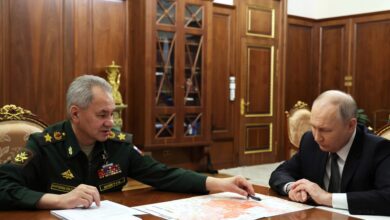In a sign of commitment, EU unlocks aid for Ukraine as it fights off Russia

European Union leaders have overcome objections from Hungary to approve a 50 billion euro ($54bn) plan to support Ukraine for the next four years.
The unanimous decision came on Thursday, as Ukraine continues its struggle to repel a full-scale Russian invasion that began nearly two years ago.
Lawmakers and experts hailed the deal as an important buttress for the continued stability of the war-torn Eastern European country, whose economy is heavily reliant on Western aid.
“The EU showed commitment to the continuous support of Ukraine under difficult geopolitical and internal circumstances … and despite alleged public impatience with this support,” European Institute lecturer George Tzogopoulos told Al Jazeera.
Thursday’s deal, known as the “Ukraine Facility“, consists of 17 billion euros ($18.5bn) in grants and 33 billion euros ($35.8bn) in loans, designed to help Ukraine rebuild and recover from the war.
The funding is also expected to help Ukraine make reforms on its path to eventual EU membership. EU leaders officially invited Ukraine to become a member in December, but around the same time, Hungary vetoed the aid package, saying Ukraine funding should not be grafted onto the EU multi-annual budget.
The aid’s eventual passage on Thursday was met with cheers from Ukrainian officials. Deputy Prime Minister Yuliya Svyrydenko wrote on Facebook that, with the funding, Ukraine had “come one step closer to economic stability for the next four years”.
Ukraine faces a $43bn budget deficit this year and expects the EU aid will cover just under half of it.

EU leaders applaud breakthrough
EU leaders, meanwhile, hailed the aid package as a means of ensuring stability and democracy in Eastern Europe.
“This locks in steadfast, long-term, predictable funding for Ukraine. EU is taking leadership & responsibility in support for Ukraine; we know what is at stake,” European Council President Charles Michel wrote on the social media platform X, formerly known as Twitter.
European Commission president Ursula von der Leyen likewise called it “a good day for Europe”.
Thursday’s agreement also marked a moment of relative unity for EU members, some of whom, like the Baltic states, are rearming against Russia. Others, like Italy, have been more wary of alienating Russia.
“The EU stands behind you long-term, until victory,” wrote Estonian Prime Minister Kaja Kallas.
“Ukraine’s security is Europe’s security,” Italian prime minister Roberta Metsola echoed on social media.
Leaders also agreed on an addition to the EU budget of two billion euros ($2.17bn) for border security, 7.6 billion euros ($8.26bn) for regional aid and 1.5 billion euros ($1.6bn) for the European Defence Fund, an initiative to ensure cooperation among member countries’ armed forces.
Hungary’s beef with Ukraine
Key aspects of the Ukraine aid deal, however, remained murky.
It was not clear if EU leaders had also approved a separate military aid fund for Ukraine worth 20 billion euros ($21.7bn), proposed last July. Nor was it clear if they would move forward with the five billion euros ($5.43bn) in military aid proposed by Josep Borrell, the EU’s foreign policy chief.
Questions also linger over what concessions were made to Hungary in order to lift its veto of the Ukraine funding package.
Hungarian Prime Minister Viktor Orban has consistently questioned the continued support for Ukraine, downplaying the threat Russia poses and calling for an annual review of any expenditures.
“We need to closely monitor the details of the compromise because the EU does not need to show that it accepted Orban’s demands, given how sensitive an issue the rule of law remains,” Tzogopoulos, the European Institute lecturer, said.
Hungary was indeed offered some concessions in exchange for its support, in the form of an opportunity to veto the spending deal next year if Ukraine fails to live up to its conditions.
Those conditions require Ukraine to uphold “effective democratic mechanisms”, such as multi-party parliamentary democracy, the rule of law and respect for minorities.
In the days leading up to Thursday’s deal, though, tensions between Hungary and EU leaders had reached a boiling point. Earlier this week, media reports emerged that the European Commission threatened to “sabotage” Hungary’s economy if it persisted in vetoing Ukraine aid.
There has also been backlash against what critics consider Hungary’s democratic backsliding. EU leaders had suspended 20 billion euros ($21.7bn) in support funds to Hungary over concerns about media freedom and the rule of law in Hungary.
They also suspended 10 billion euros ($10.8bn) due to concerns about judicial independence, but released those last December. The European Parliament wants EU leaders to reconsider that decision.

A history of Hungary tensions
The impasse over Ukraine funding has been further exacerbated by ethnic tensions with Hungary, its neighbour to the west.
An estimated 150,000 ethnic Hungarians live in western Ukraine. But in 2017 and 2019, Ukraine passed laws forbidding the teaching of minority languages in schools and their use in local government, leading to outcry in the Hungarian community.
“It was, of course, directed against the Russian language but … all minorities suffered,” Katalin Miklossy, an expert on Eastern Europe at the University of Helsinki, told Al Jazeera.
Hungarian Prime Minister Orban decried the measures as impinging on Hungarian rights in Ukraine, a factor that contributed to his decision to veto military aid for the country.
For its part, Ukraine attempted to quell any concerns with reforms to the laws, as it sought membership in the EU.
“Ukraine in 2023 backed off the minority laws as a favour to Hungary, to facilitate its application to the EU,” said Miklossy. “They reframed the law so that it was again possible to study minority rights in schools.”
Romania also protested the language laws: More than 100,000 ethnic Romanians live in Ukraine. But experts say that Romania’s overall reaction to Ukraine has served as a counterpoint to Hungary’s.
It has been a major export route for Ukrainian grain, both by sea and through the Danube River. Whereas Hungary has refused to contribute weapons or allow Ukrainian forces to pass through its territory, Romania has sent arms to Ukraine and been a conduit.
Hungary has long been considered a fly in the ointment for EU foreign policy. In early 2003, for instance — shortly after it secured EU membership — it publicly backed the US’s war in Iraq, breaking from EU consensus at the time.
Individual EU members retain the right to veto budgetary and foreign policy decisions, which require unanimity. Attempts to introduce qualified majority voting failed at an EU summit in 2002, as well as in French and Dutch referendums in 2005.

Signalling strength with a new naval victory
Hungary’s decision, however, to ultimately lift its veto on Thursday has come at a pivotal time for Ukraine.
The country is nearing the second anniversary of Russia’s invasion on February 24. In the first year of the invasion alone, Ukraine’s gross domestic product (GDP) dropped by an estimated 30 percent — its largest decline since the country achieved independence.
Experts have predicted Ukraine’s economy will rebound in the coming years, but the long slog of war has depleted its finances, making it increasingly dependent on foreign aid.
The longevity of that aid, however, is far from guaranteed. While the EU successfully reached an aid deal on Thursday, the US has struggled to cobble together its own congressional aid package, amid staunch opposition from Republicans.
The news of the EU funding agreement came just as Ukraine — desperate to show that Western money is helping to win its war with Russia — scored a new victory in the Black Sea.
Footage released by Ukrainian armed forces showed surface drones repeatedly striking the Ivanovets, a 480-tonne missile corvette, crippling it and then destroying it completely.
Video sent by drones as they approached the ship revealed gaping holes in its hull from previous attacks. The footage included a wide-angle shot of a massive explosion as missiles were fired at the Ivanovets, and a later shot captured the bow of the ship sticking out of the water, confirming it sank stern-first.
Ukraine has been attacking Russia’s Black Sea Fleet since the beginning of the war, and more intensively since last year, to protect a safe corridor through which it exports grain. Agricultural goods brought Ukraine more than $23bn last year, its agriculture ministry said.



